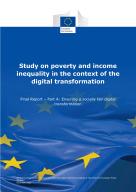Details
- Publication date
- 25 March 2024
Description
The published version of the final report of this study is composed of two documents (“Part A" and “Part B”). Part A of this study analyzes – through 27 country fiches – the extent to which each EU Member State is prepared for ensuring a socially fair digital transformation in the coming years, based on both its current situation and future prospects. In this analysis, key areas of focus include the labour market, digital skills of the population, social protection as well as cross-cutting dimensions, such as the digitalization level of businesses and the quality of digital infrastructures. Part B of the study reviews – through 30 case studies – some of the main actual and potential uses of digital technologies (including AI) by a country's public sector for improving the design and the delivery of social benefits and active labour market policies, as well as for complementing the monitoring of poverty and income inequality (the case studies analysed are mainly in Member States but also in a few third countries).

